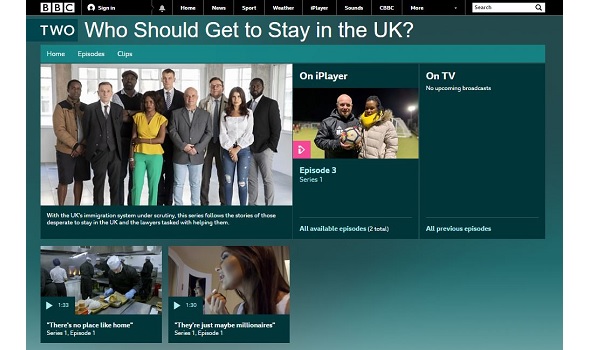Who should get to stay in the UK?
Who should get to stay in the UK?

The BBC series, 'Who should get to stay in the UK?', told the stories of some of the people trying desperately to stay in the UK, and the lawyers are helping them. The three episodes, broadcast on BBC 2 in June, are now available on BBC iPlayer.
Each episode focuses on the lives of different migrants. Some of them came to Britain on a student visa, like Valeriya from Russia and Rashed from Bangladesh. Dillian had fled to the UK from Trinidad and Tobago, while Nancy has lived here since she was six years old and the programme showed the problems that she faces in trying to stay.
The series shows how lawyers are successful in helping some migrants and gives us information that isn’t widely known about what the Home Office expects of people who are seeking asylum. For example, I didn’t know that in asylum cases the applicant needs to be perfectly consistent in everything they say to the Home Office, and that they are meant to claim asylum as soon as they come into the country or as soon as they know that they’re in danger.
What the programme also shows is how a wrong decision made by the Home Office can have life changing consequences for these people. For example, Nancy was brought to Britain as a young child and later had her own children here, but then lost her Gambian passport that had a stamp of British citizenship. The Home Office didn’t believe her when she said she was a British citizen and tried to deport her. It was only with the help of one lawyer that she was able to stay.
For others, circumstances can change dramatically, which the Home Office often doesn’t take into consideration. For example, with Rashed who came to Britain on a student visa but unfortunately was diagnosed with Crohn’s disease for which there is no treatment in Bangladesh. Was Rashed given the right to stay on humanitarian grounds? Watch to the end of Episode 1 to find out.
In conclusion it is a good programme as it succeeds into giving us an insight into how the UK immigration system works. I also found myself forming an emotional attachment to some of the migrants, especially Nancy and her family, who all believed themselves to be British and settled in the UK, but then were suddenly told they would be deported and didn’t know how to continue life here.
I was left thinking that it’s so unfair that asylum seekers aren’t allowed to work and have to survive on less than £40 per week, and that so many migrants spend years waiting for a positive response from the Home Office.


